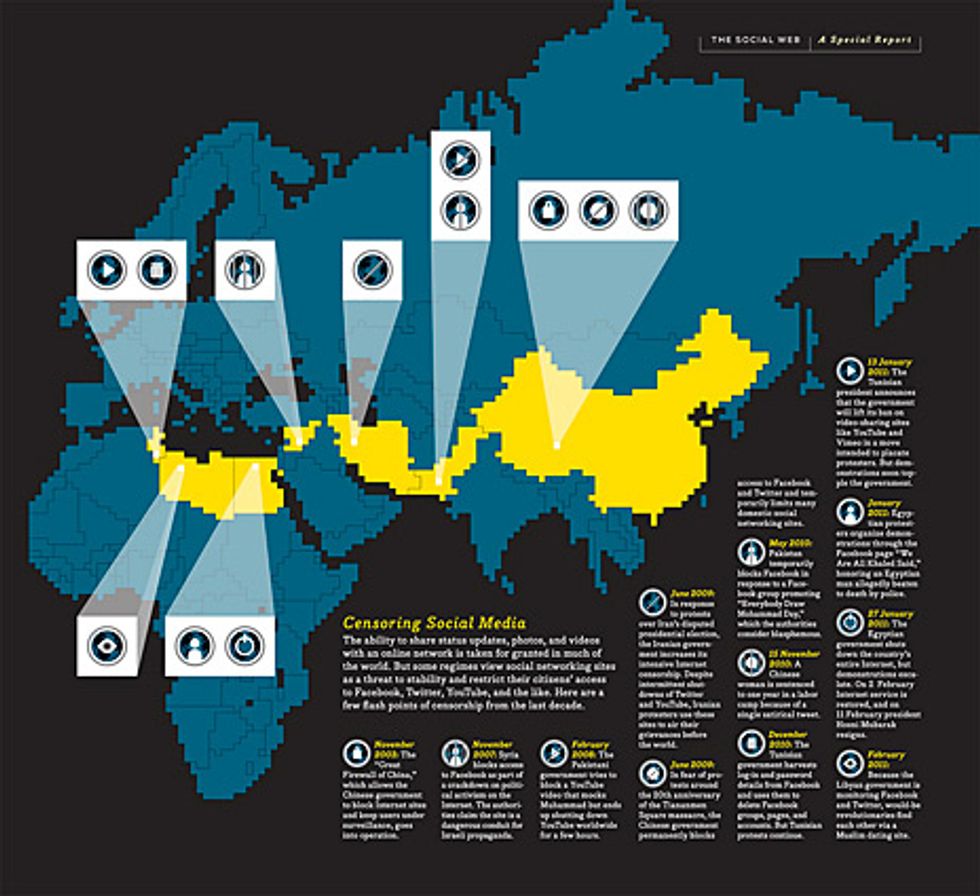What Are You Allowed to Say on China’s Social Networks?
Social networking sites, founded on the promise of free expression, have run into political trouble in China

This is part of IEEE Spectrum’s special report on the battle for the future of the social Web.
Last January, sociologist Yu Jianrong opened an account on the popular Chinese microblog service Sina Weibo. Yu called it “Take a Photo to Rescue Child Beggars,” and he encouraged its followers to post snapshots of waifs on China’s city streets. A professor at the Chinese Academy of Social Sciences, Yu hoped his project would help reunite missing children with their families.
Yu started his campaign shortly before the Chinese New Year holiday, a time for family reunions—and it struck a chord. Within days, thousands of images and other clues were posted, and an audience numbering in the tens of thousands developed. The Chinese news media even reported several success stories of rescued children.
In an interview with the influential Chinese magazine Southern Metropolis Weekly, Yu described his new sense of empowerment. “With a microblog, I finally have the same opportunities for expression as you,” he said to the reporter. “Current technology has changed the social environment. Every person has a microphone; every person is a news center. Now it’s easy to find friends; just publish a piece, and you’ll find your comrades right away.”
That’s true, of course. But microphones can also be turned off. The media hubbub surrounding Yu’s campaign soon led to official unease at the prospect of netizens (an old term that has been revived in China) tackling a social problem directly. In a leaked memo, China’s Central Propaganda Department ordered news organizations to “lower excitement” by ceasing to report on Yu’s project and giving microblogs in general a “reduced presence” on news sites. State media published editorials critical of the child-rescue effort, and Yu stopped giving interviews.
Yu’s story is a classic example of a netizen reveling in the personal expression that China’s new social networking sites offer—and quickly coming up against the limits of expression under an authoritarian regime. The country’s Internet users are genuinely confused about what’s permitted, because the Chinese government’s response to their online activities has been inconsistent. The state seems torn between allowing homegrown social networking sites to flourish as part of China’s transition to a high-tech information society and viewing them as a dangerous destabilizing force. Recent signals seem to suggest that China’s social media sites are here to stay—but that the government is learning how to shape them to its advantage.
The social media landscape in China is strikingly different from the one most Western users inhabit. The Chinese government blocks all access to foreign sites it deems difficult to control; as of this writing, that list includes Google-owned YouTube as well as the social networking sites Facebook and Twitter. Only technically savvy users can access such sites, by slipping around China’s system of Internet controls, colloquially known as the Great Firewall. But most of the 450 million Internet users behind the wall don’t miss those American companies in the slightest, thanks to the numerous copycat services that have sprung up and evolved into uniquely Chinese entities. A variety of Facebook-like sites cater to different demographic groups, from white-collar professionals to rural workers. And one popular microblog service boasts features that go far beyond Twitter’s offerings.
Analysts of China’s Internet have long noted just how sociable its Web users are. Sociology professor Guobin Yang of Barnard College, in New York City, writes in his 2009 book, The Power of the Internet in China: Citizen Activism Online, that Chinese netizens realized early on they could express themselves relatively freely online and could organize in ways that the restrictive political environment prohibits elsewhere. From the first days of bulletin boards and online discussion forums, netizens lit up the Chinese Internet. Global surveys have found that Chinese Internet users are more likely to blog and share content than are Americans, that they spend more time online, and that they express a sense of being able to live more fully in cyberspace.
Yet censorship is a constant presence in China, in subtle and not-so-subtle forms. State authorities have developed a range of strategies to manage the Internet: They block websites, scan content for keywords, and hire people to steer online discussions in directions favorable to the state. And Chinese Internet companies are well aware that their continued existence depends on their diligent self-censorship. Under Chinese law, these companies are responsible for all the content that users post and must ensure that it doesn’t violate intentionally vague dictates against subverting state power, damaging the honor of the state, disrupting social stability, and the like. To avoid losing the required licenses, all Internet companies that host content in China have departments dedicated to monitoring and deleting problematic material.
One of the biggest tests of the Chinese government’s attitude toward social networking sites came in June 2009, when the state chose to officially ignore the 20-year anniversary of the crackdown on the Tiananmen Square democracy movement. The verdict for social media was not promising. In the days leading up to the anniversary, Facebook and Twitter, which had been intermittently available in China, were cut off, apparently for good. Around the same time, dozens of domestic sites either became inaccessible or reported that they were undergoing “scheduled maintenance,” causing some critics to mockingly refer to the anniversary as Chinese Internet Maintenance Day.
One of the homegrown sites targeted by Tiananmen-obsessed officials was Fanfou, the first domestic microblog service to take off in China. During the summer of 2009, Fanfou was shut down, returned to service, and then turned off again. But soon Fanfou didn’t matter much, because a new social media force was rising: Sina Weibo.
Sina, the Internet company behind China’s largest news and entertainment portal, launched its microblog service, Sina Weibo, in August 2009. (Weibo is a contraction of weixing boke, the Mandarin term for microblog.) The company leveraged the power of celebrity blogging to turn Sina Weibo into one of the hottest places on the Web. Its growth has been explosive: By February 2011, the service had about 100 million registered users. For comparison, it took Facebook more than four years to reach the 100-million-user mark.
Sina Weibo has been quick to incorporate various social media features, rendering comparisons with Twitter increasingly moot. It allows users to upload images and videos directly into their feeds, and the service’s “forward” function, which allows users to tack on their own 140-character comments to the original post, gives it a conversational feel. With the recent introduction of group functions and an instant-messaging platform that shows users which of their contacts are online, Sina Weibo is clearly encouraging the growth of a social network.
The form of written Chinese also sets Sina Weibo and the country’s other microblogs apart from Twitter and similar sites in the West. In Chinese, most words can be expressed with one or two characters, and spaces aren’t required between words. So 140 characters can convey far more than is possible in English, and entire news stories can be told in just a couple of posts. The result: Vast amounts of information flow through Chinese microblogs.
That torrent creates problems for the companies running the microblogs because, in principle, they must police everything that’s said. “Monitoring content is an issue that is a serious headache for Weibo,” Chen Tong, Sina’s chief editor, said at a conference last year. Sina’s chief executive recently told Forbes Asia that the company has at least 100 people checking content, and many experts believe the number is much higher. Still, with an estimated 100 million posts per day going up on China’s microblogs, corporate censors are hard-pressed to take down objectionable material before it spreads through blogs, social networking sites, and discussion forums.
media sites must ensure that content doesn’t subvert
state power or damage the honor of the state
In a country where news organizations can’t hold the government to account, China’s social media sites, with their ready potential for citizen journalism, have become the primary forums for protest and activism. And Sina Weibo’s censorship department, no matter how well it’s staffed, just can’t expect to stop all the messages of dissent. In the past year, dozens of cases of injustice and wrongdoing have been exposed and publicized through social media sites, most notably through Sina Weibo. (Some users rely on anonymity to critique the government—but as with Twitter, the most influential users are those who are bold enough to post under their real names.)
Take, for example, the recently popularized phrase “My father is Li Gang.” Reposted countless times and in countless ways, it’s a reference to an incident in which a young man who was driving drunk hit two university students, killing one; the driver then attempted to talk his way out of detention by informing security guards that his father was a senior police official. Even as Chinese media were ordered to cease reporting on the touchy story, reporters and ordinary citizens continued to comment on the case in the relatively free space of social networks.
Such episodes continually test the limits of the state’s tolerance, as users try to determine just how much they can get away with. Sometimes, however, the government makes the boundaries of expression very clear. In February, Chinese-language websites overseas posted calls for people in China to emulate the democracy movements in Tunisia and Egypt by starting a “Jasmine Revolution” in more than a dozen large Chinese cities. The state’s reaction was swift and decisive. Activities on Sina Weibo were severely curtailed: Post forwarding and photo publishing were suspended, and searches for the word jasmine were blocked. Those drastic actions led to speculation that Sina Weibo was about to go the way of Fanfou and that the whole domestic microblogosphere would soon be shut down.
Instead, the restrictions turned out to be largely temporary. Reposting and photo sharing were restored once the immediate threat was deemed to have passed (though jasmine remained taboo), and authorities’ attention shifted to arresting those who used the Internet to spread the revolutionary message within China. Defending the microblog’s continued viability, Chen, the Sina editor, recently declared online that “there is zero possibility that Sina Weibo will be shut down within 20 years.”
Writing in response, Hong Bo, the influential Chinese blogger known online as Keso, listed several reasons why he agrees that Sina Weibo is here to stay. Keso noted that the greatest risks of closure came during the service’s first year of operation, when the so-called Twitter revolution in Iran had raised fears among China’s leaders about the power of microblogs. Keso wrote that since then, government authorities have started using microblogs to shape public discourse, and he noted that Sina Weibo has taken pains to ingratiate itself by exercising strict supervision. The Chinese government might have concluded that a well-monitored public forum for dissent is preferable to rumblings in the underground, he wrote.
The state’s response to a small scandal in March could signal its growing sophistication in social media matters. During the annual legislative sessions in Beijing, a delegate by the name of Wang Ping said in a speech that rural students shouldn’t be encouraged to go to college. Her comments immediately spread through Chinese microblogs, with many Sina Weibo users calling on her to step down from her position.
Wang’s response to the uproar says a lot about the future of social media in China. Rather than blaming Sina Weibo for turning her into a reviled figure, she acknowledged the importance of microblogs. “People need a channel to speak and discuss things,” she told reporters. “I myself might open a Weibo account to communicate better with the public.”
This is part of IEEE Spectrum’s special report on the battle for the future of the social Web.
This article originally appeared in print as “China’s Social Networking Problem.”




